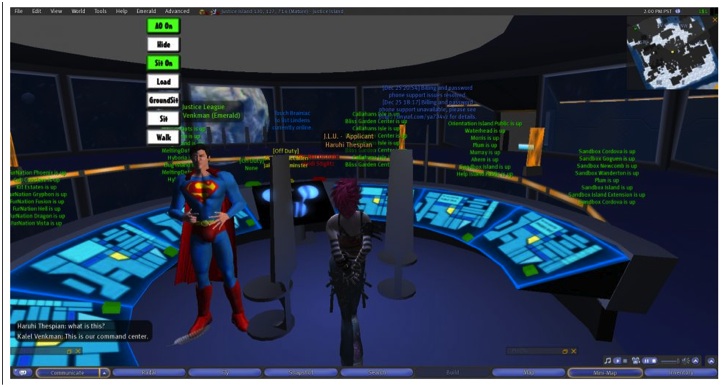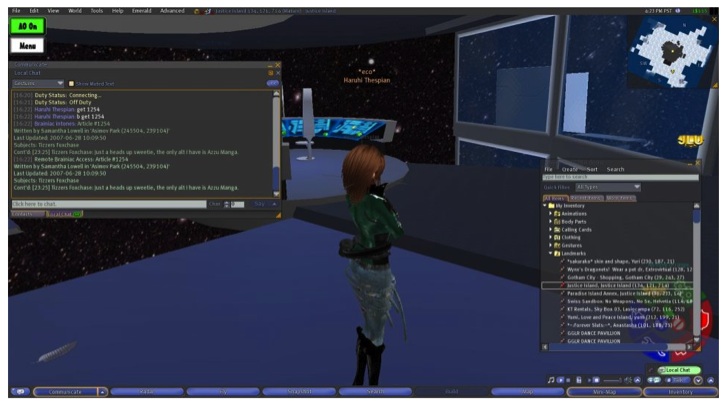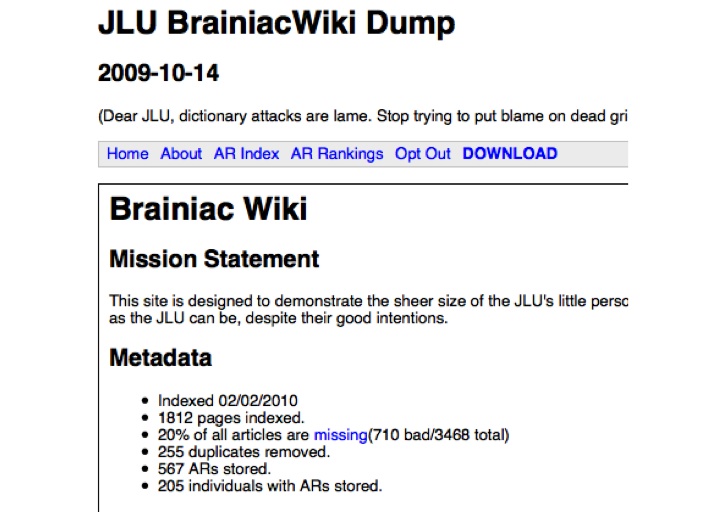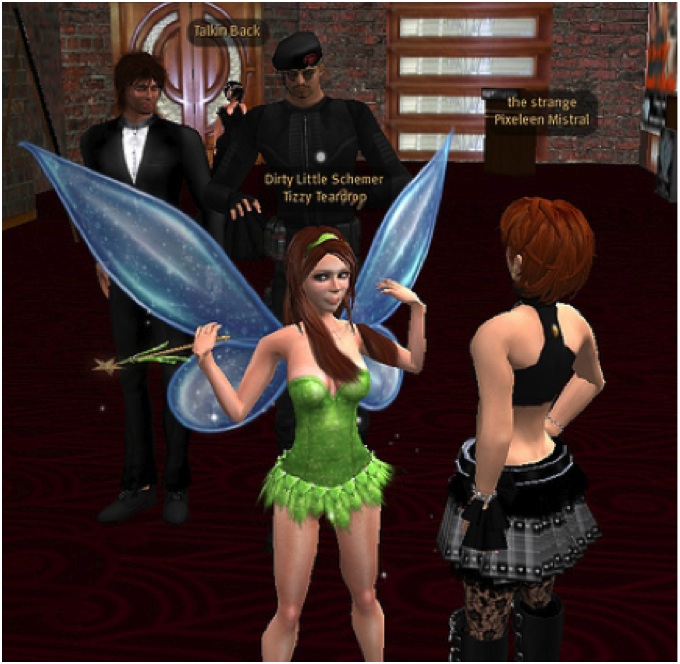Watching the Watchers: Power and Politics in Second Life (Part Two)
/This is the second part of an account of recent events in Second Life written by Peter Ludlow, a long-time observer of virtual worlds, a professor in the Philosophy Department at Northwestern University, and the co-author, with Mark Wallace, of The Second Life Herald: The Virtual Tabloid Which Witnessed the Dawn of the Metaverse, published by the MIT Press. As with any other representation of complicated and controversial events, different people will have different perspectives on what happened and different assessments of the motives and actions of the people involved. The essay is presented here in the hopes of sparking discussions about the blurring of politics and fantasy in virtual worlds, a topic to which we will return in the next installment. Watching the Watchers
by Peter Ludlow
In 2008, a member of the Justice League quit and gave an interview to the Herald, detailing the operations of the Justice League, claiming that they were keeping massive intel on Second Life users, were abuse reporting people capriciously, sometimes successfully getting them banned without cause, and that members of Linden Lab were complicit in these operations. These charges were dismissed by the League. Tizzers Foxchase and the Woodbury kids needed the smoking gun if their charges were going to stick, and so they began to plot an infiltration operation.
Infiltrating the Justice League would not be easy. Clearly any friend links to Woodbury would raise red flags. Nor would it work to just create a new avatar and ask if it could join Woodbury. New avatars are dangerous for obvious reasons. What one needed was a clean avatar with a reasonable age on it. Kalel certainly knew that it would be a nightmare if details of his operations ever made it into the wrong hands. So whoever took ran the avatar would have to be special - someone who had a reasonable rez date on their avatar, no friendship links to Woodbury, and who could disarm the seemingly paranoid Kalel and pass as an anti-griefing do-gooder. In 2009, the Woodbury kids found just such a player.
Haruhi Thespian was an avatar without an agenda, and a certain kind of élan. As it turns out, she was a thespian in real life and an award winning improv actor. Perhaps she had just the right stuff to infiltrate the Justice League. One day she was chatting with the Woodbury kids and they asked if she would be willing to undertake the operation. Harui decided that it sounded like fun and Operation Wrong Hands was born.

Kalel shows Haruhi the JLU "command center"
Haruhi was quickly admitted into the Justice League, but there were lingering suspicions. One day it seemed to Harui that her cover had been blown:
13:57] Kalel Venkman: I have to admit I'm having trouble figuring you out.
[13:57] Kalel Venkman: You just seem like the perfect applicant, and that's just uncommon.
[13:58] Haruhi Thespian: hehe, is that a compliment?
[13:58] Kalel Venkman: Every now and then we get a really good one that hits all the marks.
[13:59] Kalel Venkman: Anyway, it's just so rare, it takes me by surprise when it happens.
[13:59] Haruhi Thespian: I dont know what to say hehe
[13:59] Haruhi Thespian: >.<
[14:00] Haruhi Thespian: I'm so good its Criminal? (quote from the anime Melancholy of Haruhi Suzumiya)
[14:01] Kalel Venkman: Sort of.
[14:01] Kalel Venkman: We've got a pile of people from Woodbury trying to sneak their way into the JLU, and on the whole they're not very clever.
[14:01] Kalel Venkman: If somebody did get in, it would have to be somebody who looked like as good an applicant as you do.
[14:02] Haruhi Thespian: it seems I've applied at a bad time >.<
[14:02] Haruhi Thespian: thats unfortunate
[14:02] Kalel Venkman: And at the same time, we've just gone through an episode with JB Hancroft.
[14:03] Kalel Venkman: Now he was a problem, because nobody trusted him, and everybody was afraid to say so.
[14:03] Kalel Venkman: And I had nagging doubts too, but I suppressed them, thinking it was just me.
[14:03] Haruhi Thespian: Its understandable I guess
[14:03] Kalel Venkman: Always listen to your gut feelings, Haruhi. They'll never steer you wrong.
[14:04] Haruhi Thespian: I'll take that advice to heart
While in chat with Kalel, Haruhi was also in skype with Tizzers Foxchase and other Woodbury students. Haruhi told them she thought her cover was blown. Tizzers suggested that Haruhi talk to Kalel about boy troubles. The misdirection worked.
[14:04] Haruhi Thespian: So... this is kinda awkward? hehe, I'm sorry
[14:06] Haruhi Thespian: Hey Kalel, can I ask you for some advice?
[14:06] Haruhi Thespian: its about RL boy troubles
[14:07] Kalel Venkman: Sure.
Days later, Haruhi downloaded the JLU wiki and posted it to the Woodbury IRC channel, and from there it was reposted to numerous locations on the Internet. Within days it had been reproduced all over the internet.

Haruhi gets access to the JLU database
In an interview given to the Herald after the fact, Haruhi described Kalel as a kind and loving man who thought he was doing good. How Haruhi was able to maintain the disconnect is far from clear. In comments to the interview a disgusted reader summed up his feelings about the act of betrayal: "this makes for really unappetizing reading. Ick.". Another reader offered that this is simply the price one has to pay for being a spy:
It's the nature of spying that those who find themselves in that role have to go to unpleasant places and do things that in normal circumstances they would balk at. ... Personally I take my hat off to Haruhi for being willing to carry out this role and to then show a sense of morality and decency in her subsequent actions.

Haruhi informs the JLU of her actions
Whatever the moral standing of Haruhi's actions, one thing is clear: Haruhi had opened a Pandora's Box.
The Justice League did not merely have a data base on Second Life users. It had a massive data base on Second Life users. It contained 1,700 pages of information and misinformation on users, ranging from chat logs, to presumed real life identities of avatars (including real life information), to a history of the abuse reports that they had filed -- and many many abuse reports had been filed.
Predictably, the content of the Justice League data base was posted on various web sites. Kalel, understandably furious, responded in a scattershot fashion by filing Digital Millennium Copyright Act take-down notices, bizarrely arguing that the chat logs etc were his intellectual property. When some Internet service providers complied, the materials were moved to safer havens in Canada and ultimately Montenegro. Woodbury sympathizers organized the material into a searchable database.

Meanwhile Herald editor Pixeleen Mistral began combing through the database and found example after example of disturbing revelations. Not only was she surprised to learn that she had been declared a griefer, but the claims of Linden complicity appeared to be supported. One particularly telling Wiki entry seemed to suggest that Linden employee Plexus Linden was revealing the real life identity of avatars.

Pixeleen published a series of stories to the Herald, including passages like the above. Then the other shoe dropped. Kalel filed a DMCA take-down notice against the Herald! Six Apart, which owns the Typepad blog hosting service used by the Herald, removed the material, apparently without giving any thought at all as to whether the charges were frivolous. Pixeleen would have to counterfile.
This was going to be no simple matter. Counterfiling would require Pixeleen to reveal her real life information, and she had guarded her privacy for years. Understandably so. Crossing people in Second Life can lead to real life stalking. As previous Herald editor Peter Ludlow had learned, angering someone with an article could lead to real life confrontations that ranged from angry phone calls from the United Arab Emirates to orchestrated campaigns by users to call his university and try to get him fired (not unlike what had happened to a Woodbury University instructor).
Pixeleen Mistral was a petite 20 something female avatar with a sharp fashion sense and a bit ditzy on technical matters. Her typist, turned out to be Duke University computer scientist Mark McCahill, who in addition to being male, 6'5'' tall, and having no apparent fashion sense at all, had been team leader in the development of the Gopher search program, team leader in the development of POPmail, and had worked with Tim Berners-Lee on the protocols for the World Wide Web. He was one of the gods of the Internet. He was also going to have to out himself.

Tizzers' alt and Pixeleen Chat (Intlibber Brautigan stands behind Tizzers)
Legally, if you file a DMCA counter notice, the service provider is required by law to restore the missing material in 14 working days. Several weeks after filing the counter claim McCahill contacted Typepad and asked them why they hadn't restored the material. They responded that they had lost it and couldn't restore it. McCahill of course had backed up the material, but disgusted, he moved the Herald from Typepad to another service.
As of today, this is where matters stand. Second Lifers continue to pour over the leaked materials, Kalel continues to file bogus DMCA actions, and feeble service providers like Typepad continue to enforce them.
It's a sad state of affairs on many levels, not least because of what it says about our future in both the real and virtual worlds. How does this keep happening to us? Even in play are we condemned to be "defended" by institutions that overreact to evil and effectively become a greater danger than what they are trying to defend us from?
One cannot help but think of George W. Bush when reading Haruhi's account of Kalel Venkman. A good hearted guy who "trusted his gut", and decided he needed to protect us from some distant and obscure and poorly defined axis of evil, constructed out of a kind of guilt by association. A guy who would turn the place he cares about and wants to protect into a massive surveillance state. A guy who would recklessly apply laws in ways for which they were not intended, and a guy who just did not no how to back off or change his mind when it was clear that the only sane thing to do was to stop digging. And must it always be the case that the institutions that we rely on for communication and other infrastructure needs will roll over at the drop of a hat, forever opting to side with the censor whatever the legal position of the censor?
And then too one has to wonder how much more dangerous our world is because of people like Kalel and George W. Bush. Tizzers once confided to Pixeleen that the only way he kept the Woodbury crew together and engaged was by giving them an enemy to fight against: Kalel. Is it not at least equally plausible that what enemies we have are held together and galvanized by enemies like George W. Bush? - people with no sense of proportion and who fight blindly, not caring about the effectiveness of their methods or the innocents that are harmed along the way.
In the end, this isn't a story about the virtual world imitating the real world, nor is it a story about how the real world imitates the virtual world. The problem is that neither the real world nor the virtual worlds are prior. They both seem to bubble up from some deep dark corner of the human mind. These events aren't really about games or virtual spaces. The events are really about us and who we are.


![Reblog this post [with Zemanta]](http://img.zemanta.com/reblog_e.png?x-id=185a3a03-6241-46e9-8e94-94f87355ac95)